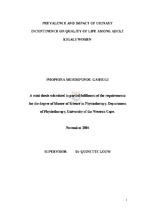Prevalence and impact of urinary incontinence on quality of life among adult Kigali women
Abstract
Urinary incontinence has already been identified worldwide for years as a health problem affecting essentially women, which can interfere with their overall quality of life. However in Rwanda, this problem has yet not been addressed adequately either because of lack of expertise, or because of cultural traditions associated with taboos among women. Social conditions of women facing this problem hinder them from seeking possibly adequate medical assistance. It is important that this problem be addressed because it may lead to disability, social seclusion, psychological stress and economic burdens. This study was a pioneer one, intended to diagnose the extent of the problem through determining the prevalence of urinary incontinence as well as its impact on the quality of life among women. The study will hopefully be followed by the promotion of physiotherapy to tackle the problem and therefore reduce the number of people suffering from urinary incontinence.

